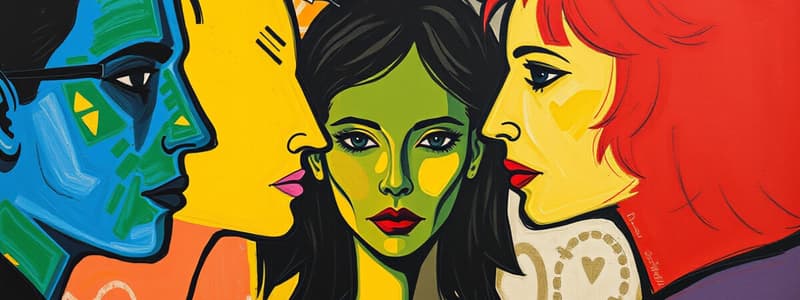Podcast
Questions and Answers
What is Labeling Theory?
What is Labeling Theory?
- Criminal behavior is purely an individual choice.
- Labels have no impact on behavior.
- All acts of deviance are planned and intentional.
- Individuals form their self-identity based on societal labels. (correct)
What is external labeling?
What is external labeling?
Labeling by other people
What does internal labeling refer to?
What does internal labeling refer to?
Thinking about how others see you and starting to believe their views.
Who is Howard S. Becker?
Who is Howard S. Becker?
What is Social Deviance?
What is Social Deviance?
What is Primary Deviance?
What is Primary Deviance?
What is Secondary Deviance?
What is Secondary Deviance?
What is Broken Windows Theory of Deviance?
What is Broken Windows Theory of Deviance?
What is the Looking Glass Self?
What is the Looking Glass Self?
What does the Generalized Other refer to?
What does the Generalized Other refer to?
What is stigma?
What is stigma?
Flashcards are hidden until you start studying
Study Notes
Labeling Theory
- Individuals subconsciously notice how others perceive and label them, shaping their self-identity.
- Being labeled as deviant can lead to increased deviant behavior as individuals internalize these labels.
External Labeling
- Involves labeling by others in society, influencing how individuals view themselves.
Internal Labeling
- Occurs when individuals start to embrace and believe the perceptions and labels assigned to them by others.
Howard S. Becker
- Proposed that deviance is not inherent in individuals, but rather constructed by social groups.
- Social groups determine norms and label transgressions, leading to the creation of deviance through societal reaction.
Social Deviance
- Refers to any behavior that violates established social norms, varying across cultures and contexts.
Primary Deviance
- The initial act of rule-breaking that can result in being labeled a "deviant."
- Following this label, individuals may alter their behavior due to changing perceptions from others.
Secondary Deviance
- Deviant behavior that follows primary deviance, driven by the new identity formed from the deviant label and societal expectations.
Broken Windows Theory of Deviance
- Suggests that social perceptions influence individual behavior, asserting that societal views can encourage or discourage deviant acts.
Looking Glass Self
- The concept that individuals form their self-image based on how they believe they are perceived by others, impacting their self-esteem and identity.
The Generalized Other
- Refers to the collective societal expectations and norms that shape our behavior.
- Influences how individuals act by incorporating an understanding of what is deemed acceptable across various social situations.
Stigma
- A negative label that not only influences how others behave towards an individual but also significantly impacts the person's self-concept and social identity.
Studying That Suits You
Use AI to generate personalized quizzes and flashcards to suit your learning preferences.




